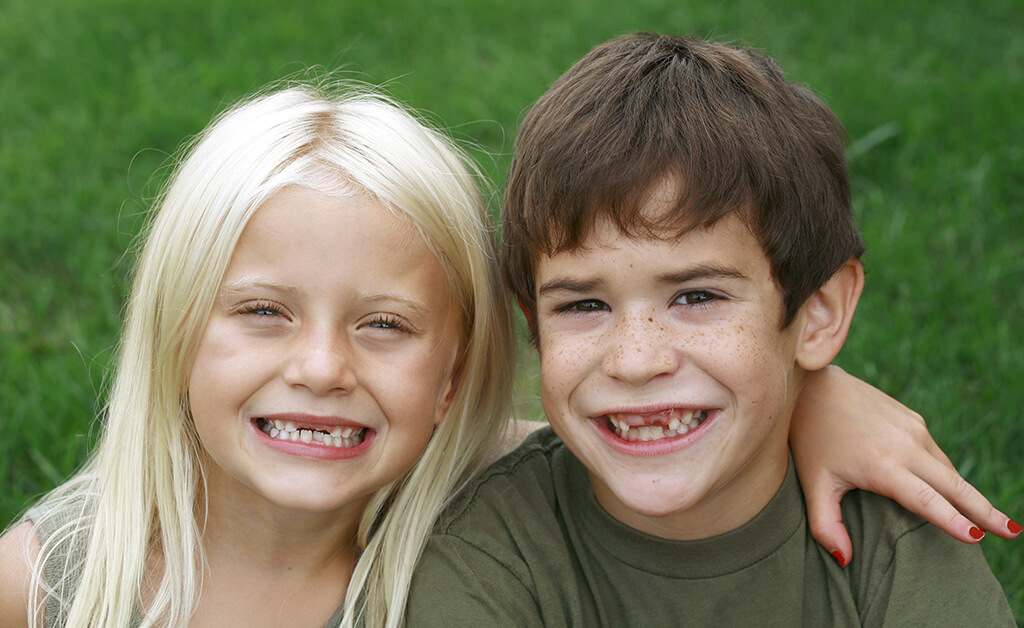If you think your new baby’s smile is cute now, just wait until their first teeth come in!
Primary teeth are usually referred to as “baby teeth,” but there’s nothing babyish about them. In fact, your child won’t lose their first baby tooth until the age of five or six, and molars remain in place until children are 10 to 12 years old!
Yes, all baby teeth will eventually fall out. But while they are in your child’s mouth, they play a very important role in proper chewing, speech, overall health, growth and development. That’s why taking good care of baby teeth from the start is essential.
If a cavity in a baby tooth is left untreated, it can lead to pain and infection, plus the bacteria will spread to neighboring teeth. An unhealthy tooth can lead to unhealthy bone underneath it, which can damage the developing permanent tooth before it even erupts into the mouth.
For these reasons and many more, both the American Academy of Pediatric Dentistry and the American Academy of Pediatrics strongly recommend visiting a pediatric dentist by age one, or when the first tooth erupts (whichever comes first) to have your child’s baby teeth evaluated.
Baby teeth are present at birth
Your baby’s 20 primary teeth are already present in their jaws at birth, and you can expect their first tooth to make its debut anywhere between six months to one year. Many babies have sore or tender gums when their baby teeth start to come in, and you may experience some sleepless nights while they are teething.
Gently rubbing your child’s gums with a soft wet washcloth or gauze pad can help soothe them. You can also give them a teething toy to chew on–many of these are designed to be chilled in your refrigerator or freezer for extra relief. If your child is still in pain, consult your pediatric dentist or pediatrician.
When baby teeth come in
The first few years of life are a busy time for your child’s mouth–most children already have a full set of 20 baby teeth in place by their third birthday. Every child is unique, but the first baby teeth to come in are usually in the bottom front followed by the top front. (And yes, their first toothy grins are adorable!)
Baby teeth save space for permanent teeth to come in
Baby teeth are just as important to infants and young children as permanent teeth are to older children and young adults. Baby teeth not only help your child chew and speak properly, but they also save space for your child’s future permanent teeth.
Most of the time, a baby tooth remains in your child’s mouth until the permanent tooth underneath it is ready to emerge. The roots of the baby tooth dissolve, the tooth becomes loose, and it falls out (cue the tooth fairy!). The permanent tooth usually begins to appear a few weeks later.
If your child loses a baby tooth too early (before the permanent tooth is ready to erupt), or the tooth is accidentally knocked out or removed by a dentist because of decay, this space must be saved. Your pediatric dentist can insert a space maintainer to stop other teeth from shifting before the permanent tooth emerges.
If the teeth on either side of the empty space are able to move freely, there may not be enough room for the permanent tooth when it comes in. Crowded and misaligned teeth are more difficult to clean, prone to tooth decay, and may also require costly and time-consuming orthodontic treatment.
So, there you have it–baby teeth are critical to the development of a healthy and correctly aligned smile.
Visit a pediatric dentist by age one or when the first baby tooth erupts
Besides checking for early stages of tooth decay, cavities, and other problems, the dentist can evaluate the progression of your child’s baby teeth and show you how to clean them properly. If your child uses a pacifier or sucks their thumb, a dentist can guide you through these habits as well. Your child’s smile is worth it!
Caring for your child’s teeth
You can start taking care of your child’s future teeth from the day they are born–simply wipe your newborn’s gums with a soft wet washcloth or gauze pad. Most children will have their four front teeth by the time they are six months old, although some don’t get their first tooth until after their first birthday.
A good rule of thumb: if you can see the tooth, it can decay. Start brushing your child’s teeth as soon as they appear, using a soft baby toothbrush and a small smear of fluoride toothpaste (about the size of a grain of rice) every morning and night.
For children who are 3-6 years of age, use a pea-sized amount of fluoride toothpaste and continue brushing every morning and night. Adult assistance will be needed until at least age 6. Be sure to remind your child not to swallow toothpaste!
By establishing good oral habits for your child now, you’re likely setting them up for years of healthy smiles to come.
Schedule your appointment today
At Smiles In Motion Pediatric Dentistry, your child isn’t just a patient and you’re not just a parent–you’re family. Everything we do is focused on providing the highest-quality dental care for your child and teaching them healthy oral habits that last a lifetime. We also partner closely with parents, giving you the guidance and support you need to help care for your child’s growing smile. To schedule an appointment, contact us today!
